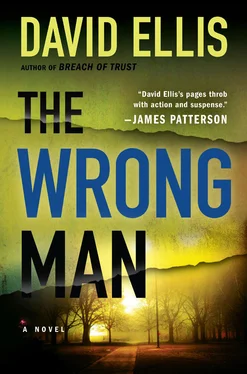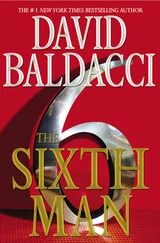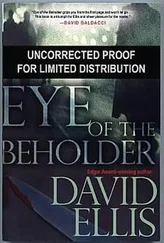David Ellis - The Wrong Man
Здесь есть возможность читать онлайн «David Ellis - The Wrong Man» весь текст электронной книги совершенно бесплатно (целиком полную версию без сокращений). В некоторых случаях можно слушать аудио, скачать через торрент в формате fb2 и присутствует краткое содержание. Жанр: Триллер, на английском языке. Описание произведения, (предисловие) а так же отзывы посетителей доступны на портале библиотеки ЛибКат.
- Название:The Wrong Man
- Автор:
- Жанр:
- Год:неизвестен
- ISBN:нет данных
- Рейтинг книги:3 / 5. Голосов: 1
-
Избранное:Добавить в избранное
- Отзывы:
-
Ваша оценка:
- 60
- 1
- 2
- 3
- 4
- 5
The Wrong Man: краткое содержание, описание и аннотация
Предлагаем к чтению аннотацию, описание, краткое содержание или предисловие (зависит от того, что написал сам автор книги «The Wrong Man»). Если вы не нашли необходимую информацию о книге — напишите в комментариях, мы постараемся отыскать её.
The Wrong Man — читать онлайн бесплатно полную книгу (весь текст) целиком
Ниже представлен текст книги, разбитый по страницам. Система сохранения места последней прочитанной страницы, позволяет с удобством читать онлайн бесплатно книгу «The Wrong Man», без необходимости каждый раз заново искать на чём Вы остановились. Поставьте закладку, и сможете в любой момент перейти на страницу, на которой закончили чтение.
Интервал:
Закладка:
Manning moved to within an inch of Cahill’s face.
“Who took you in when you had nobody?”
“You did, sir.”
“Who gave you a job and a place to live?”
“You did, sir.”
“Who has given you the opportunity to change the world?”
“You, sir.”
“This is a war, Patrick, and very soon everyone’s going to have to take a side. Make sure you’re on the right side. No more mistakes. Now go.”
Patrick Cahill turned on his heel and marched out of the office.
28
Joel Lightner and I listened to the footfalls of Ray Rubinkowski, the arthritic clicking of his ankles, as he came back downstairs. Neither of us really understood what he was about to show us. When Ray came back into the parlor room, he handed me a two-page stapled document.
“I don’t know if this means anything to you,” he said. “Wendy said it didn’t to her.”
That was the second time he’d said that.
It was a legal document. The heading said Exhibit A: Response to Interrogatory #2. In the header of the document, right-adjusted, was the name of a lawsuit and a docket number: 09 CH 1741. That told me the lawsuit was a civil action in state court that was filed in 2009.
The lawsuit was styled LabelTek Industries Inc. v. Global Harvest International Inc.
I didn’t recognize LabelTek or Global Harvest International. Nothing in the document told me the subject matter of the lawsuit.
“This is a discovery document in a lawsuit,” I explained. “Kathy was a paralegal, so discovery would be her primary responsibility.”
“That’s right, it’s what she did,” said Ray.
Each side in a lawsuit gets to ask questions, and request documentation, from the other side to get ready for trial. We call this “discovery.” When a party submits written questions to the other side, they are known as “interrogatories.” I consider this aspect of being a lawyer “boring” and “unbearable.”
But maybe not this one time. The document I was holding was a response to an interrogatory. The answer was long, so the party answering this interrogatory had apparently made its response a separate exhibit. For all I knew, that was standard. But I didn’t really know. Discovery was largely for civil litigants. I avoided civil litigation like I avoided raw vegetables.
The response to the interrogatory listed a number of companies. The list filled two pages, with forty-seven companies. There were a couple of recognizable Fortune 500 companies on this list but mostly names I’d never heard.
I looked up at Ray Rubinkowski, who was watching me closely. “Kathy gave you this?” I asked.
Ray nodded. “A couple of days after Kathy died, I got a FedEx package. It was a birthday card for me, a gift-wrapped sweater, and this document.”
I didn’t see the relevance of this document to anything I wanted to know.
“For all I knew, it was accidental,” he said. “It fell in or something. I’ve been known to misplace an item now and again, and I figured she probably did just that.”
Sure, that was possible. “So she mailed this a day or two before her death?”
“Yeah.”
It was hard to believe that was a coincidence. “It was for your birthday-the package, I mean.”
“Yeah. My sixty-first birthday. Our birthdays were the same week. I turned sixty-one, she would’ve turned twenty-four. She wasn’t going to make it out here to see us until the following weekend, so I suppose she wanted to make sure I got my present on time before my birthday. That would be like her.”
Okay, so maybe a coincidence. “Do you still have the FedEx package?”
He shook his head no. That was okay. We knew the approximate date it was sent and the sender and recipient. If we needed proof of the delivery, we’d get it.
“On the back,” Lightner said to me.
I turned to him. “What?”
“The back of the document,” he said.
I flipped the document over. There was handwriting. A grand total of four letters, followed by two question marks: AN NM??
“I have no idea,” Ray said, when I asked him if the initials AN or NM meant anything to him.
“Did Kathy say anything about sending you something in the mail?” I tried.
“Not that I can remember. No, I don’t think so.”
“Did she say anything about her job near the time she died? Anything about trouble she was having at work or anywhere else, for that matter?”
Ray jabbed a finger at me. “You’re doing it again. You’re trying to dig up dirt on my little girl.”
I raised my hands. “I wasn’t. But never mind.”
Kathy’s parents stared at me for a long time. It was clear that I’d reached my limit.
I thanked them profusely and left their house with the document in tow. When we reached our car and were well out of earshot of the Rubinkowskis, Joel and I looked at each other.
“Probably nothing,” I said.
“Yeah, probably,” he agreed. “But the timing sure is interesting.”
29
The conference room in our law firm had become the unofficial war room for the Stoller trial. We had blow-up photos of the crime scene on tripods in one corner. A television rested in another corner, with a DVD of Tom Stoller’s interrogation ready to play at any time. A few boxes rested on the conference room table.
The room was more than we needed. As these matters go, this wasn’t a document-intensive case. Most of the paper was the physical evidence and forensic reports concerning the same. At the moment, there wasn’t much for witnesses, either. We had Dr. Sofian Baraniq and Bobby Hilton, the Army Ranger buddy. Then there was a guy named Sheldon Pierson who lived right by where the murder occurred on Gehringer Avenue. He estimated that he was probably outside during the time of the murder, but he couldn’t add much because he couldn’t hear or see a damn thing.
But I thought he could add a lot for me.
I was reviewing the responding police officer’s write-up while Bradley was poring through the case file of LabelTek Industries Inc. v. Global Harvest International Inc. Yesterday, after my interview with the Rubinkowskis, I’d told Bradley to pull the entire file from the circuit court.
I was about to check on his progress when Shauna burst into the room like she had news.
“Yes, Ms. Tasker?” I said.
She held up a document. “Motion from the prosecution. You’re not going to like it.”
“Are you sure I’m not going to like it?”
“Pretty darn sure, yeah.”
“She’s moving to bar the insanity defense,” I said.
Shauna cocked her head. “How did you know that? Did she tell you?”
“No, but it’s what I would have done.” I nodded and held out my hand for the document. “She’s claiming lack of cooperation, right?”
“Right.” She handed me the motion.
I was actually surprised Wendy Kotowski had waited this long. When you plead insanity, you place your mental condition at issue, and you must permit the government’s shrinks to evaluate you. Tom had been as stingy with the prosecution’s doctors as he had been with Dr. Baraniq-and with me. The state was arguing that the defendant was making it impossible for them to fully evaluate him, and, thus, he should not be permitted to assert the insanity defense.
Bradley grabbed Shauna’s copy and read it over. “What does Nash do with this?” he asked.
“Grants it, probably,” I said.
“And you’re calm about this.”
“Does it help if I freak out?” I read the motion in its entirety. It was well done. Wendy was always a good writer. Before she started first-chairing in the felony courtrooms, a lot of the other ACAs would turn to her for help on briefs. There is a “brief bank” in the county attorney’s office where samples of various motions and briefs are kept, and many of them were penned by Wendy Kotowski.
Читать дальшеИнтервал:
Закладка:
Похожие книги на «The Wrong Man»
Представляем Вашему вниманию похожие книги на «The Wrong Man» списком для выбора. Мы отобрали схожую по названию и смыслу литературу в надежде предоставить читателям больше вариантов отыскать новые, интересные, ещё непрочитанные произведения.
Обсуждение, отзывы о книге «The Wrong Man» и просто собственные мнения читателей. Оставьте ваши комментарии, напишите, что Вы думаете о произведении, его смысле или главных героях. Укажите что конкретно понравилось, а что нет, и почему Вы так считаете.












